The mental health industry is booming—but so is the competition. With 97% of healthcare organizations believing AI will play a major role in the next five years and patients increasingly turning to Google before picking up the phone, digital marketing for mental health professionals isn’t optional anymore.
The challenge? Everything you do must be HIPAA-compliant. Every ad, every social media post, every patient testimonial must protect privacy while building trust. Consequently, this guide shows you how to master digital marketing for mental health professionals without risking violations that could cost you $2.1 million annually.
Why Digital Marketing for Mental Health Professionals Matters Now
The numbers tell the story:
- Mental health apps market: $7.48 billion in 2024, growing at 14.6% CAGR
- Patient behavior: 65% search online before contacting a provider
- Competition reality: Digital mental health funding has increased competition dramatically
- Revenue opportunity: The US behavioral health market will hit $132.46 billion by 2032
But here’s what matters most: 73% of Gen Z and 68% of Millennials explore health advice on Google before consulting a medical professional. If you’re not visible online, you’re invisible to your ideal patients. Therefore, establishing a strong digital presence becomes essential for practice growth.
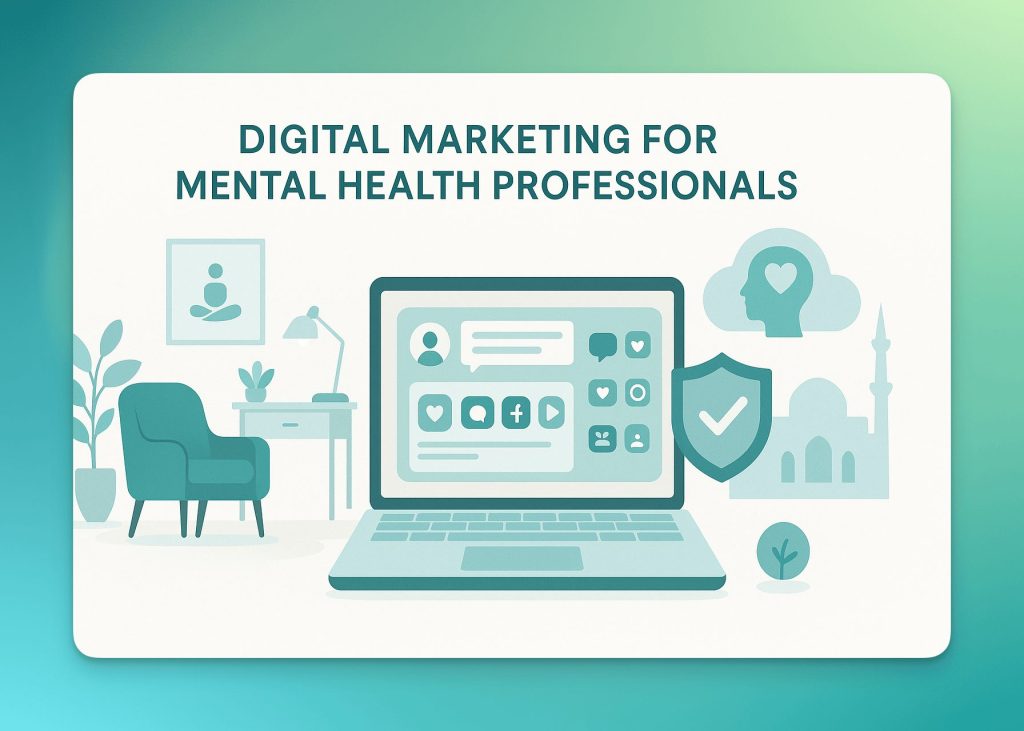
The Mental Health Marketing Landscape in 2025
Rising Competition Drives Up Costs
Digital marketing for mental health professionals has become more competitive than ever. With heavily funded competitors like Talkspace, Headspace, and Teladoc entering the market, patient acquisition costs are climbing across all channels.
Impact on Your Practice
What This Means for Your Practice:
- Google Ads costs are increasing as more providers compete
- Social media advertising requires larger budgets for visibility
- Content marketing becomes more important for cost-effective reach
- Furthermore, specialization and niche positioning become critical differentiators
Patients Are Savvy Healthcare Consumers
Today’s patients don’t just accept the first therapist they find. They research extensively, compare options, and make informed decisions. According to recent data, patients rely on online resources two times more than referrals from other providers.
Patient Research Behavior:
- They investigate your credentials and specializations
- Reviews and testimonials become crucial decision factors (when available)
- Your website’s professionalism and trust signals matter significantly
- Meanwhile, they expect easy online scheduling and communication options
HIPAA-Compliant Digital Marketing for Mental Health Professionals
Understanding compliance requirements is the foundation of successful mental health marketing.
Understanding HIPAA in Marketing Context
HIPAA violations aren’t just administrative headaches—they come with severe financial consequences. Furthermore, in 2025, penalties include:
- Unintentional violations: $141 per violation, up to $2.1 million annually
- Reasonable cause: $1,424 to $71,162 per violation
- Willful neglect (corrected): Minimum $14,232 per violation
- Willful neglect (uncorrected): $68,928 to $2.07 million per violation
What Counts as PHI in Marketing
Additionally, protected health information in marketing includes:
- Patient names, photos, or identifying information
- Treatment details or diagnoses
- Appointment information
- Similarly, any data that could identify a specific patient
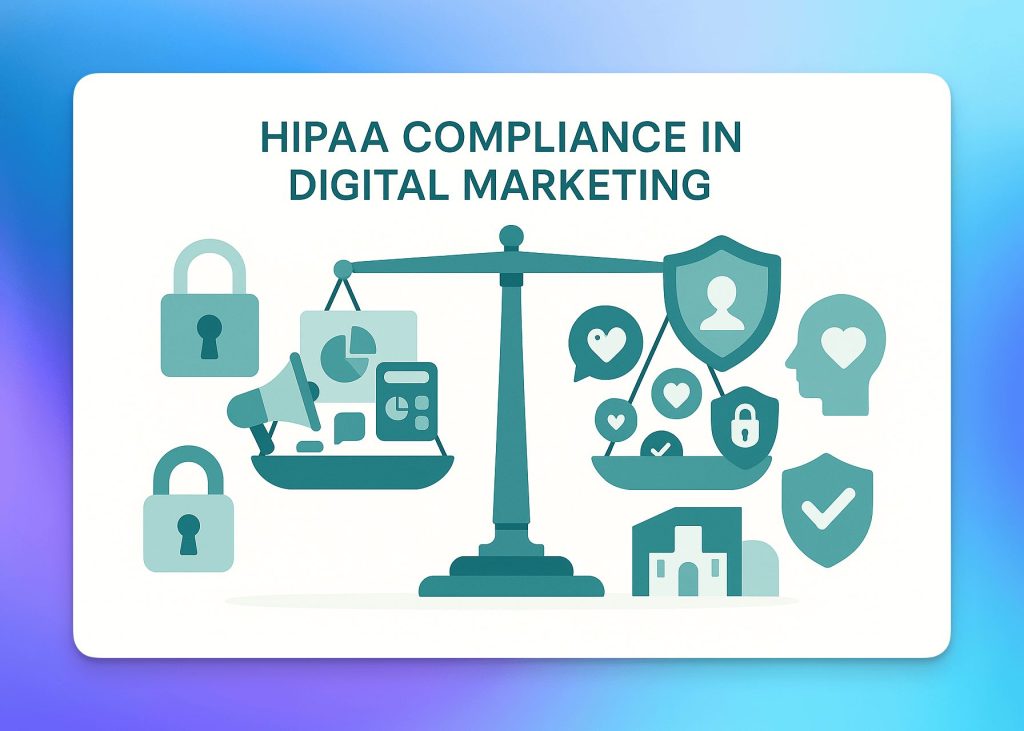
HIPAA-Compliant Marketing Strategies
Successfully implementing compliant strategies requires careful planning and execution.
1. Website Optimization for Mental Health Practices
Your website is often the first impression potential patients have of your practice. Moreover, it needs to build trust while maintaining compliance.
Essential Elements:
- Professional design that reflects your brand
- Clear information about services and specializations
- Easy online scheduling system
- HIPAA-compliant patient portal
- Fast loading times (under 3 seconds)
- Mobile optimisation for smartphone users
Website Compliance Considerations
Compliance Requirements:
- Avoid patient photos without written consent
- Instead, use generic stock photos or professional headshots only
- Include clear privacy policies and HIPAA notices
- Additionally, ensure secure contact forms and scheduling systems
2. Content Marketing That Builds Trust
Content marketing is particularly effective for digital marketing for mental health professionals because it addresses the educational needs of potential patients while building authority.
Effective Content Types for Mental Health Practices
Content Strategies:
- Blog posts about mental health conditions (general information only)
- Self-care tips and wellness advice
- Explanation of different therapy approaches
- Myth-busting articles about mental health treatment
- Seasonal mental health topics (holiday stress, seasonal affective disorder)
For comprehensive content strategies, check our guide on creating effective clinical documentation to streamline your practice operations.
Content Compliance Rules
Compliance Guidelines:
- Never reference specific patients or cases
- Instead, focus on general educational information
- Avoid detailed treatment descriptions
- Furthermore, don’t use patient stories without proper authorization
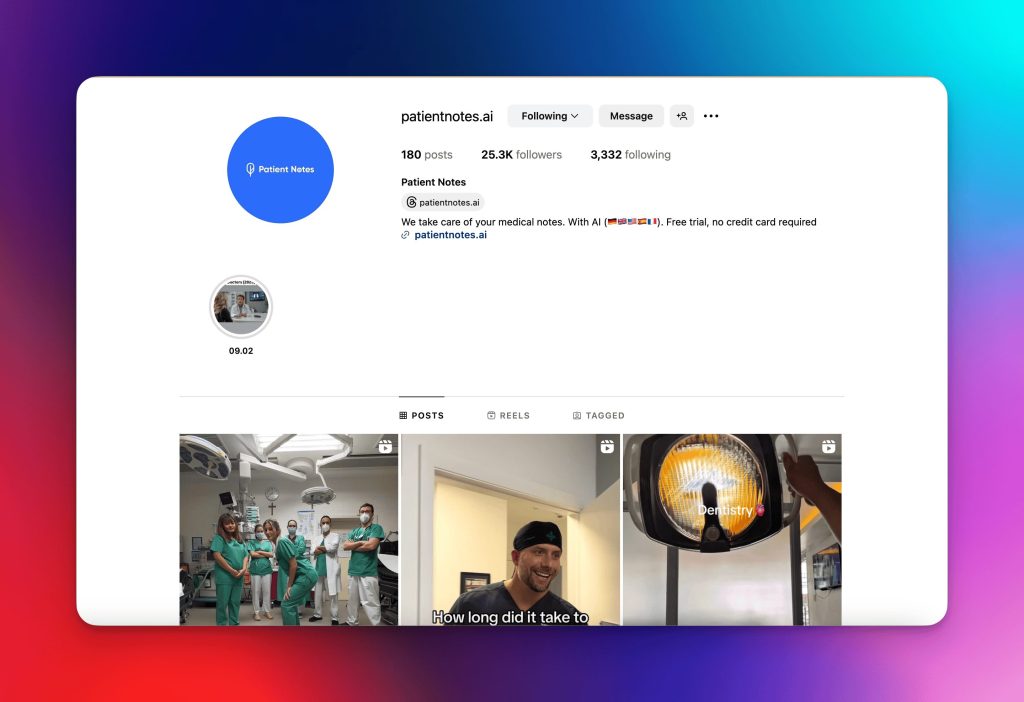
3. Search Engine Optimization (SEO) for Mental Health Practices
With 100 billion healthcare searches on Google annually and 70,000 health-related searches per minute, SEO is crucial for digital marketing for mental health professionals.
Local SEO Priorities
Local Optimization Strategies:
- Optimize Google My Business listing
- Target location-specific keywords (“therapist near me,” “counseling in [city]”)
- Build local citations and directory listings
- Additionally, encourage compliant online reviews
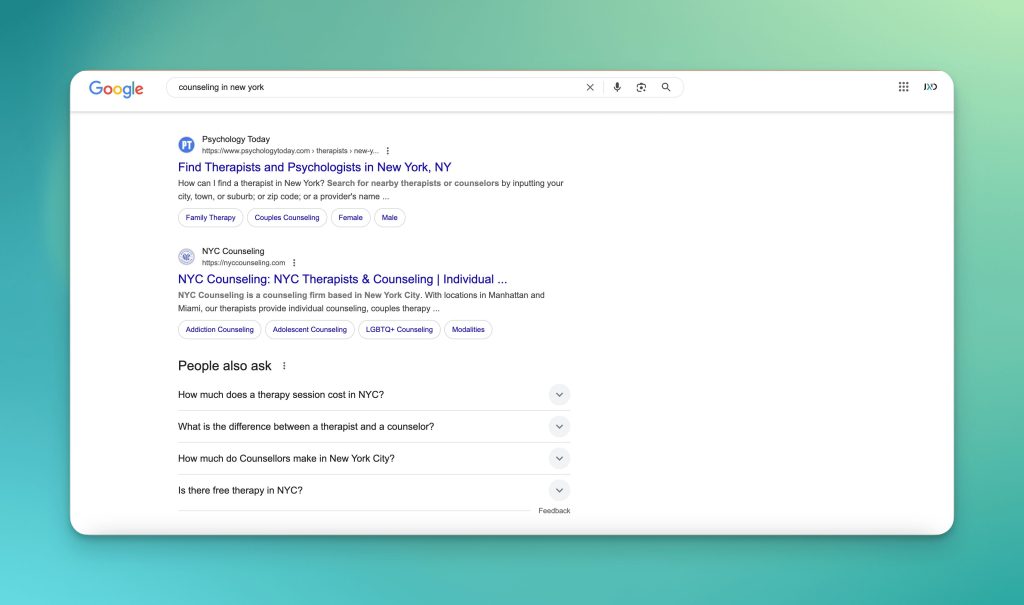
Content SEO Strategy
SEO Best Practices:
- Target long-tail keywords related to your specializations
- Create location-specific service pages
- Optimize for “near me” searches
- Furthermore, build authority through educational content
4. Social Media Marketing for Mental Health Professionals
Social media can be powerful for digital marketing for mental health professionals, but it requires careful compliance management.
Platform-Specific Strategies
Facebook (98% of healthcare marketers use it):
- Educational posts about mental health awareness
- Professional updates and practice news
- Live Q&A sessions about general mental health topics
- Community resource sharing
Instagram Marketing for Therapists
Instagram Strategies:
- Mental health infographics and tips
- Professional behind-the-scenes content
- Motivational quotes and wellness reminders
- Stories highlighting practice culture
LinkedIn for Professional Networking
LinkedIn Best Practices:
- Professional articles and thought leadership
- Industry news and updates
- Networking with other healthcare professionals
- B2B content for referral sources
Social Media Compliance Guidelines
Compliance Requirements:
- Never post patient information or photos
- Obtain written consent for any patient-related content
- Provide regular HIPAA training for staff managing social media
- Moreover, monitor comments for compliance issues
5. Paid Advertising for Mental Health Practices
Paid advertising allows you to reach potential patients actively searching for mental health services.
Google Ads Best Practices
Google Advertising Strategies:
- Target specific mental health conditions and treatments
- Use location targeting for local patients
- Create compelling ad copy that addresses patient concerns
- Include clear calls-to-action for scheduling
Facebook and Instagram Ads
Social Media Advertising:
- Use basic demographic targeting (age, location, interests)
- Avoid advanced audience targeting that could imply health conditions
- Focus on general wellness and self-care messaging
- Additionally, ensure landing pages are HIPAA-compliant
Advertising Compliance Considerations
Compliance Requirements:
- Platforms like Google and Facebook are not inherently HIPAA-compliant
- However, you cannot use patient data for advanced targeting
- All advertising must have proper consent protocols
- Furthermore, landing pages must maintain compliance standards
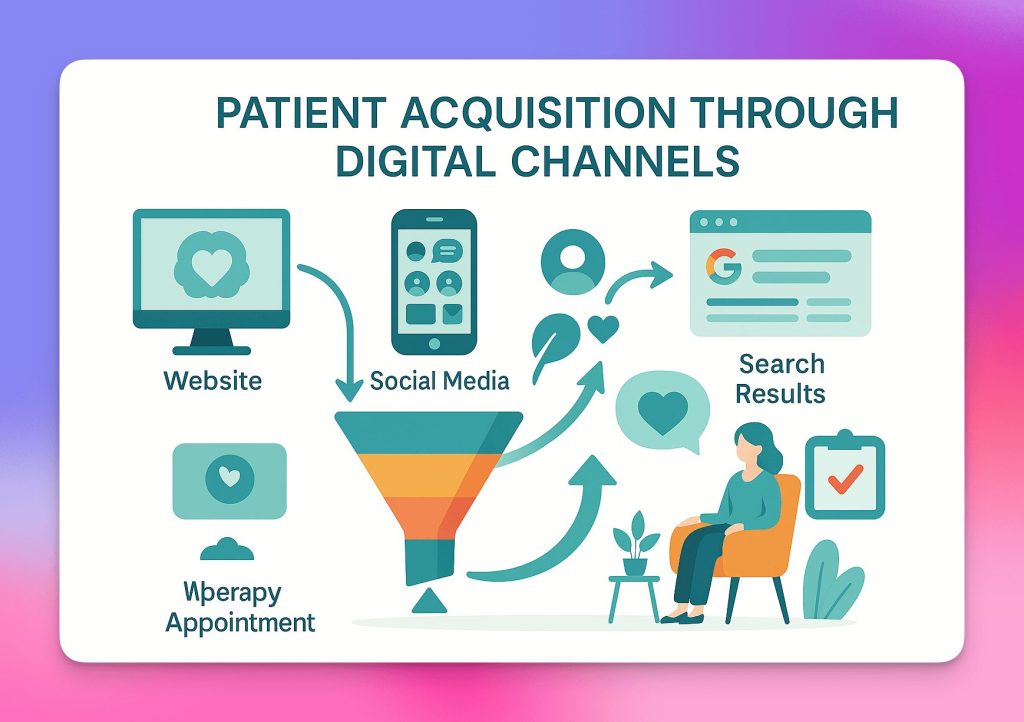
Digital Marketing for Mental Health Professionals: Platform Selection
Choosing the right tools ensures both effectiveness and compliance.
HIPAA-Compliant Marketing Tools
Analytics Solutions:
- Improvado: HIPAA-compliant marketing intelligence platform
- Tableau: Business intelligence with BAA options
- Meanwhile, Google Analytics: Can be compliant with proper configuration (no patient data)
Email Marketing:
- Zendesk: Enterprise plans offer HIPAA compliance
- Mailchimp: Has HIPAA-compliant options with proper setup
- Similarly, Constant Contact: Offers business associate agreements
Customer Relationship Management:
- Salesforce Health Cloud: Built for healthcare compliance
- HubSpot: Can be configured for HIPAA compliance
- Additionally, SimplePractice: All-in-one practice management solution
For comprehensive practice management, consider Patient Notes AI at $59/month for HIPAA-compliant clinical documentation with a 7-day free trial. Consequently, this solution streamlines operations while maintaining compliance standards.
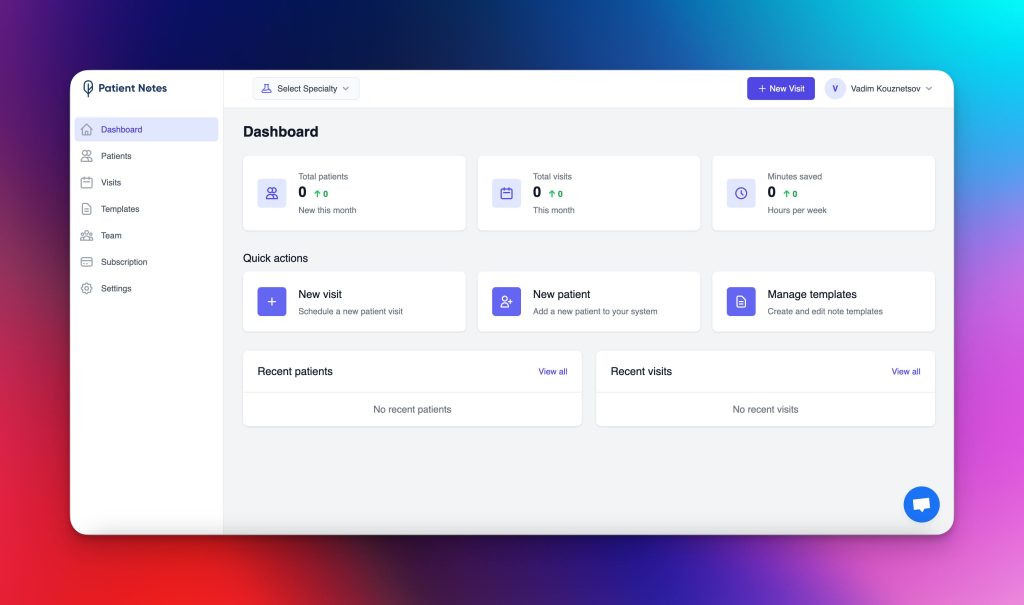
Building Your Digital Marketing for Mental Health Professionals Strategy
Step 1: Define Your Specialty and Target Audience
Identify Your Niche:
- What specific mental health conditions do you treat?
- Which therapy approaches do you specialize in?
- What age groups or demographics do you serve best?
- Meanwhile, what unique qualifications or experience do you have?
Understand Your Ideal Patient:
- Demographics (age, location, income level)
- Specific mental health concerns
- Preferred communication methods
- Technology comfort level
- Similarly, insurance considerations
Step 2: Create Your Compliance Framework
Documentation Requirements:
- Written consent forms for any marketing use of patient information
- Privacy policies that clearly explain data usage
- Staff training records for HIPAA compliance
- Moreover, regular compliance audits and updates
Technology Safeguards:
- Secure website hosting with SSL certificates
- HIPAA-compliant contact forms and scheduling systems
- Encrypted email communications
- Additionally, secure patient portal access
Step 3: Develop Your Content Strategy
Content Calendar Planning:
- Monthly themes based on mental health awareness topics
- Weekly educational blog posts
- Daily social media content
- Similarly, seasonal campaigns (Mental Health Awareness Month, etc.)
Content Types by Channel:
- Website: Comprehensive service pages, blog articles, resource guides
- Social Media: Educational posts, tips, professional updates
- Email: Newsletters, appointment reminders, wellness tips
- Meanwhile, Paid Ads: Targeted campaigns for specific services
Step 4: Implement Tracking and Analytics
Key Performance Indicators (KPIs):
- Website traffic and source analysis
- Conversion rates (appointments scheduled)
- Patient acquisition cost by channel
- Social media engagement rates
- Furthermore, email open and click-through rates
Compliance Monitoring:
- Regular audits of all marketing materials
- Staff compliance training updates
- Patient feedback on privacy concerns
- Additionally, technology security assessments
Advanced Digital Marketing for Mental Health Professionals Strategies
Telehealth Marketing
With the growth of virtual care, marketing your telehealth services requires special consideration.
Telehealth Advantages to Highlight:
- Convenience and accessibility
- Reduced stigma for some patients
- Flexible scheduling options
- HIPAA-compliant video platforms
Marketing Messaging:
- “HIPAA-compliant telehealth platform for secure, private sessions”
- “Connect with your therapist from anywhere—convenient and completely secure”
- “Virtual therapy that prioritizes your privacy and comfort”
Referral Marketing
Professional referrals remain important in mental health, and digital tools can enhance these relationships.
Digital Referral Strategies:
- Professional networking on LinkedIn
- Referral partner resource sharing
- Collaborative educational content
- Professional directory listings
Referral Source Development:
- Primary care physicians
- School counselors and social workers
- Other mental health professionals
- Community organizations
Reputation Management
Online reputation is crucial for mental health practices, but managing it requires careful compliance.
Compliant Review Strategies:
- Request general reviews about practice experience
- Respond professionally to all reviews
- Address concerns without revealing any patient information
- Highlight positive feedback in marketing materials
Managing Negative Reviews:
- Never share patient information in responses
- Address concerns professionally and privately
- Offer to discuss issues offline
- Document all interactions for compliance purposes
Measuring Success in Digital Marketing for Mental Health Professionals
Patient Acquisition Metrics
Tracking New Patients:
- Source of patient acquisition (website, social media, referral)
- Cost per patient acquisition by channel
- Conversion rates from inquiries to appointments
- Patient lifetime value
Digital Performance Metrics:
- Website traffic and behavior analysis
- Social media engagement and follower growth
- Email marketing performance
- Paid advertising ROI
Long-term Practice Growth
Business Development Indicators:
- Monthly recurring revenue growth
- Patient retention rates
- Referral source development
- Market share in your specialization
Compliance Metrics:
- Zero HIPAA violations or complaints
- Regular compliance training completion
- Patient satisfaction with privacy measures
- Staff awareness of compliance requirements
Common Mistakes in Digital Marketing for Mental Health Professionals
HIPAA Violations to Avoid
Photography and Video:
- Never use patient photos without written consent
- Avoid filming in areas where patients might be visible
- Don’t share patient stories or testimonials without authorization
Data Collection:
- Don’t collect unnecessary personal information
- Ensure all forms are HIPAA-compliant
- Avoid tracking patient behavior on non-secure platforms
Communications:
- Never discuss specific patients on social media
- Don’t share patient progress or outcomes
- Avoid detailed case studies without proper consent
Marketing Mistakes That Hurt ROI
Targeting Errors:
- Trying to serve everyone instead of specializing
- Poor geographic targeting in paid ads
- Ignoring mobile optimization
- Focusing on features instead of patient benefits
Content Mistakes:
- Publishing inconsistent or infrequent content
- Using medical jargon patients don’t understand
- Failing to address patient concerns and questions
- Neglecting local SEO opportunities
Building Your Digital Marketing for Mental Health Professionals Team
Internal Team Development
Essential Roles:
- Marketing coordinator with HIPAA training
- Content creator familiar with mental health topics
- Social media manager with compliance knowledge
- Data analyst for performance tracking
Training Requirements:
- Regular HIPAA compliance updates
- Mental health stigma awareness
- Platform-specific best practices
- Crisis communication protocols
External Partners
When to Outsource:
- Specialized technical implementations
- Content creation for specific expertise areas
- Paid advertising management
- Compliance auditing and consulting
Selecting Partners:
- Experience with healthcare marketing
- Understanding of HIPAA compliance
- Proven track record with mental health practices
- Ability to sign business associate agreements
For comprehensive practice management support, explore our digital marketing strategies for healthcare professionals guide.
The Future of Digital Marketing for Mental Health Professionals
Emerging Trends
AI and Automation:
- Chatbots for initial patient inquiries (with compliance safeguards)
- Automated appointment scheduling and reminders
- Personalized content recommendations
- Predictive analytics for patient needs
Technology Integration:
- Integrated practice management systems
- Telehealth platform marketing
- Patient portal utilization
- Mobile app development
Regulatory Changes:
- Evolving HIPAA interpretations for digital marketing
- State-specific telehealth regulations
- Insurance coverage for digital services
- Patient data privacy legislation
Preparing for Changes
Staying Current:
- Regular compliance training updates
- Industry conference attendance
- Professional association membership
- Continuing education in digital marketing
Technology Adaptation:
- Regular software updates and security patches
- Evaluation of new marketing tools
- Integration of compliant automation
- Investment in cybersecurity measures
Taking Action: Your Digital Marketing for Mental Health Professionals Roadmap
Month 1-2: Foundation Building
- Complete HIPAA compliance audit
- Optimize website for local SEO
- Set up Google My Business listing
- Create social media profiles with compliance guidelines
Month 3-4: Content Development
- Launch blog with educational content
- Develop social media content calendar
- Create patient resource guides
- Implement email marketing system
Month 5-6: Paid Advertising
- Launch targeted Google Ads campaigns
- Experiment with social media advertising
- Test different messaging approaches
- Optimize based on performance data
Month 7-12: Scale and Optimize
- Expand successful campaigns
- Develop referral partner relationships
- Create advanced content assets
- Implement marketing automation
Making HIPAA Compliance Your Competitive Advantage
Instead of viewing HIPAA as a limitation, use it as a differentiator. When patients see that you take privacy seriously in your marketing, it builds trust in your clinical practice.
Trust-Building Messages:
- “We take your privacy seriously—HIPAA-compliant in every interaction”
- “Your health data is secure with us—compliant technology and training”
- “All staff undergo extensive HIPAA training to protect your information”
The mental health market is growing rapidly, but success requires more than just good clinical skills. It demands strategic, compliant digital marketing that reaches patients where they are while protecting their privacy.
Digital marketing for mental health professionals isn’t about choosing between growth and compliance—it’s about using both to build a thriving, trustworthy practice that serves your community’s mental health needs.
Start with compliance, build with strategy, and scale with confidence. Your patients—and your practice—deserve nothing less.



